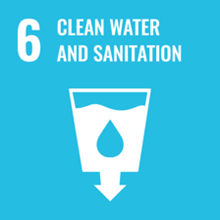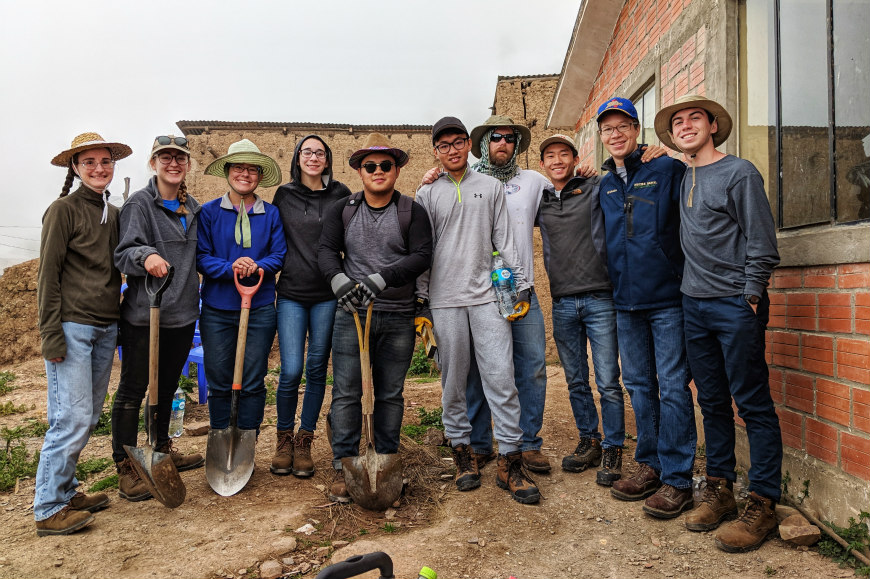
Ensuring clean and safe drinking water, as well as adequate sanitation and hygiene, is accessible for all.
This goal envisions a world where clean water and adequate sanitation are accessible to all, ensuring improved health, well-being, and environmental sustainability. Achieving this goal is not only a matter of ensuring a basic human right but also a critical foundation for achieving other sustainable development objectives, as access to clean water and sanitation is fundamental to poverty reduction, economic development, and ecosystem health.
The University of Tulsa strives to contribute to Sustainable Development Goal 6 in several ways:
- Water Conservation: Implement water conservation measures on campus to reduce water consumption in buildings, landscaping, and other facilities. This includes the use of low-flow fixtures, rainwater harvesting, and efficient irrigation systems.
- Water Quality Management: Actively manage and monitor the quality of water sources on campus to ensure that drinking water is safe and meets regulatory standards.
- Research and Education: Offer academic programs, research initiatives, and courses related to water management, water quality, and environmental sustainability. This helps raise awareness and build expertise in water-related issues.
- Sustainable Practices: Implement sustainable landscaping practices that reduce water usage, such as xeriscaping and native plant gardens, which require less irrigation.
- Sanitation Facilities: Ensure that sanitation facilities on campus are safe, accessible, and well-maintained to promote proper hygiene and sanitation among students and staff.


- Community Outreach: Engage with the local community to raise awareness about water conservation and sanitation issues. TU can collaborate with local organizations and schools to promote responsible water usage.
- Partnerships: Collaborate with local and regional water authorities, environmental organizations, and government agencies to address water-related challenges and promote sustainable water management practices.
- Infrastructure Sustainability: Incorporate sustainable design and construction practices in campus infrastructure projects, including sustainable stormwater management systems.
- Student Engagement: Involve students in water-related projects and research, allowing them to contribute to SDG 6 goals and gain practical experience in environmental sustainability.
TU contributes to SDG 6 by promoting responsible water usage, ensuring access to clean water and sanitation on campus, and raising awareness about water-related challenges and solutions. Additionally, these efforts can serve as examples of sustainable practices that benefit both the campus community and the broader society in terms of water conservation and sanitation.
SDG 6 Targets
Implement policies to maximize water reuse across the university
Implement a process to prevent polluted water from entering the water system
Provide free drinking water for students, staff, and visitors
Research
5+
Total Scholars
114
Total Publications
News
- Stuart Price (J.D. ’82) moved to Tulsa in the late 1970s to attend The University of Tulsa’s College of Law, discovering after graduation that his calling was actually as an […]
- UTulsa is researching blending hydrogen into natural gas pipelines to reduce carbon emissions by replacing a portion of the methane in the gas with hydrogen, which produces no carbon dioxide […]
- University of Tulsa mechanical engineering alumnus Tim Latimer (BS ’12) was dealing with drilling equipment that kept breaking from the high temperatures deep underground. “I had never even heard of […]
- Growing up in New Mexico where her family operates an oil and gas business, Ileana Braddock was surrounded by people whose livelihoods were impacted by the booms and busts of […]
- On June 26, The University of Tulsa (UTulsa) welcomed six representatives from China University of Petroleum (CUP)-Beijing to its campus led by Vice President Guangqing Zhang. The visit marked a […]
- Eleven students from The University of Tulsa are participating in the Future Green Energy Leaders Summer Program hosted by China University of Petroleum, Beijing (CUPB). This is the first time […]
- The University of Tulsa’s (UTulsa) Mohan Kelkar, Ph.D., Chair of Petroleum Engineering, recently traveled to the Bahrain Centre for Strategic, International and Energy Studies to speak on energy transition. The […]
- The renewable energy sector is experiencing remarkable growth, with solar and wind power at the forefront. Helping to ensure these technologies can achieve their maximum potential is Assistant Professor of […]
- The James Beard Foundation has announced its 2024 Media Award nominees, and The University of Tulsa’s Switchyard magazine has received two nominations in the categories of Food Coverage in a […]
- The University of Tulsa’s College of Law recently hosted a Sustainable Energy and Resource Law (SERL) conversation about energy on tribal lands. TU Associate Professor of Law Warigia Bowman, director […]